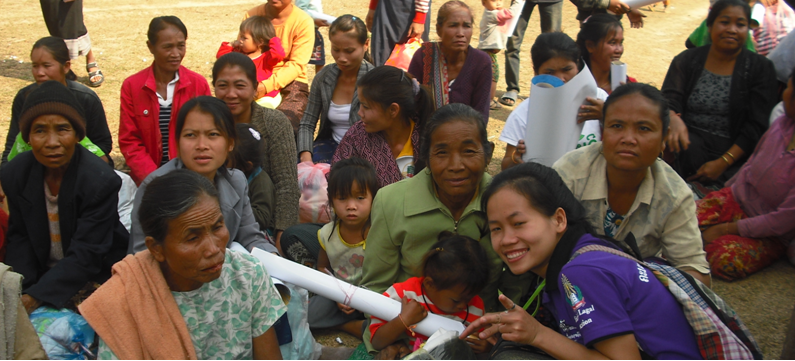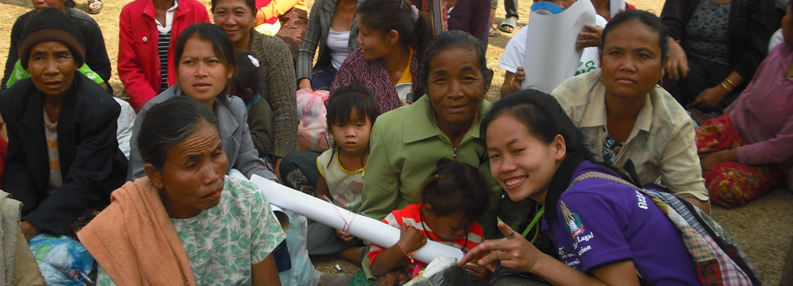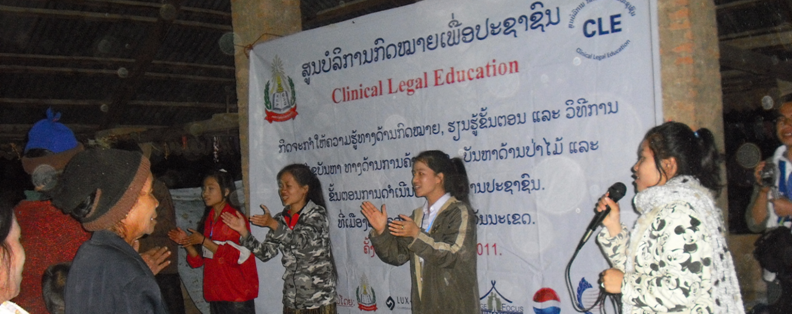 Thip’s Journey from Shy Student to Avid Access to Justice Advocate
Thip’s Journey from Shy Student to Avid Access to Justice Advocate
Thip Nouansyvong, interviewed by Catherine Gallagher
The first thing you notice about Thip is that she is extraordinarily petite. The second thing you notice is how powerful she is – a strong leader, a champion for justice, someone with a fierce sense of determination that attracts others and encourages them to work together. It’s truly not size that counts in Thip’s world, but dedication and tenacity. She’s immediately recognizable and known throughout the BABSEACLE network because she has travelled quite extensively as a workshop trainer and trainer of trainers. And at the ripe old age of 24, she is mentoring other young lawyers.
In 2011, Thip took a team from Laos to Thailand to participate in BABSEACLE’s Trio for Justice events in Chiang Mai. She was a tiny mother duck to the group, a good friend to her colleagues from Thailand and Viet Nam, a very good trainer of interns, and great at demonstrating the lively Lao version of the “Chicken Dance.” We decided to send legal intern Catherine Gallagher out to get Thip’s story and share it with our readers.
Why did you go into law?
I’ve wanted to be a lawyer since high school, when my friend’s sister spoke of it and encouraged us to apply for law school. I thought being a lawyer would be a good job – I would make a lot of money and be very rich. I did not start out to help people, but to have a good life. And I learned English, because a lawyer in Laos who speaks English can make even more money.
How did you “find” CLE?
I started law school in 2004 and found CLE in my 4th year in 2007. One of my professors announced that there was a new activity for law students and they needed more students to come and help.
I asked for more information and the professor said it would help improve my study skills like reading, writing, talking and thinking about legal issues. It would help me to practice law and helping people would help me improve my speaking skills – I spoke too fast in Lao. I thought the program would teach me public speaking.
What was it like being an intern when you first started?
I started as a CLE volunteer and there were ten of us. I was excited because Bruce, Wendy, Lao law professors and students from other schools came to our university to meet us. Bruce organized a workshop for us. I also felt a little shy. Before the workshop, I didn’t understand what CLE was, but after the workshop I understood about 90% – still, it was a very new idea to me.
Shortly after that workshop, our group planned to do community teaching at the Drug Rehabilitation Centre in Vientiane. We would teach them about criminal law. This was my first time teaching the law – we planned a one-hour class but it only lasted 30 minutes! We were shocked it finished so quickly and we had to quickly think of another activity to do with the learners. I found that exciting – exhilarating really. We were students and we were teachers!
How did you become a Fellow?
After being a volunteer in the CLE group and graduating law school, I applied to become a Fellow of CLE. A Fellow is like an assistant for a law professor. We help to train other law students who are volunteers. It’s a progression from volunteer to intern to Fellow. At first, I wasn’t sure I wanted to be one, because I didn’t think it would be easy and you do have to speak English. Because of the language requirement, only three people from my class applied – everyone else was scared about the English. I applied and I was very lucky because I have good interview skills – I was interviewed by Bruce, Wendy and
one other foreigner. We are paid as Fellows, but I also had another job as a computer technician.
Is it very different, being a Fellow?
Very different, because we coordinate all the work in the CLE program. We decide what communities to go to and what to teach; we discuss this with the law professors. We make a plan and then tell the volunteers where we are going and what they will do there. Law professors make the connections with the community leaders and then we coordinate the program.
I have been a Fellow for two years now. I have learned how to work with law students and professors and coordinate the CLE program. I have had the chance to go to Chiang Mai, Thailand; Phnom Penh, Cambodia, and Vinh, Viet Nam – three other countries! I take part in trainings and I also observe. BABSEACLE pays for me to do this. I can’t believe my good fortune. I really enjoy travelling and meeting new people, though I still worry a little bit about the need to speak English. It is easy in Thailand but the people are different. And of course I still love Laos best, as I can communicate easily here.
Is there a certain area in Lao society that you would like to help change with CLE in your legal professional life?
I am most interested in justice for the Lao people in remote areas. I don’t want the government to take advantage of them in terms of their land, home, food, property, work, etc. If they are not taught about their land law rights, then they will have nothing. We can change this by teaching people in the remote communities. It is very hard, because we have to work with the government and follow their policies – and some of their policies are just not right. A non-governmental organization (NGO) can help to change some of the government’s policies, for example as Village Focus International (VFI) has done on forestry law. We work with GTZ (a German NGO) on land law reform and they take our students to remote areas to teach about land law.
Another problem is human trafficking. There was in a village in Savanakhet and we taught there with the United Nations Office on Drugs and Crime (UNODC). More than 200 people attended. Human trafficking is frequent in that area, so I was happy we could reach them and that they were so interested. They had a lot of questions for us and some people cried when we told them about the human trafficking – they were thinking about their children who left for Thailand and now they don’t know where they are. They were very worried that maybe their children had been trafficked.
When the law students come back from teaching the people in the remote areas they announce class by class to the other law students that they will give a presentation about problems facing local people. We multiply the effects of their community teaching: they present to over 100 people when they come back. This is a very effective way of showing many law students how they can help as lawyers in Laos.
Can you explain why as a young female law graduate in Laos, this is so important to you?
Most lawyers and professors in Laos are men. I am very proud of myself for getting this far as a woman. I tell other young women that they can do what I’ve done – they don’t need to be male to do this job. I like being a role model for them and encouraging them. There must be women doing this job or we will not be represented in the legal system in Laos.
When we choose volunteers at CLE we have a 50:50 male to female ratio, which is very important and progressive. It will take a long time before there is gender equality in Laos in the legal profession, but at CLE, men and women are paid the same salary.
Do you think your role as a Fellow will prepare you to become a better lawyer?
My time as a Fellow has already helped me to become a good lawyer – I have so much experience and I know how to research the law and work with many different people from all over the world. Now I don’t just study by books like at university. Now I know how the law affects people and how important it is to teach people interactively about the law. I now have better skills to talk to new people and I don’t feel so nervous about working with clients or other international lawyers. Maybe I am not so shy now. I am an intern lawyer at the Lao Bar Association; I observe in the Court and I want to speak in the Court in the future.
Do you think you will continue to be involved in social justice activities?
CLE opened my eyes to the situation of those less fortunate. Before, I only cared about being rich; now I want to help people. I want to be a part of setting up in-house clinics. To be a real lawyer, I need to be here and work with people facing real struggles in their lives. I could never have imagined teaching Lao law students and international BABSEACLE interns myself two years ago and I’m proud of my progress — but I don’t want to be a law professor. I want to be a real lawyer, active in access to justice work.


